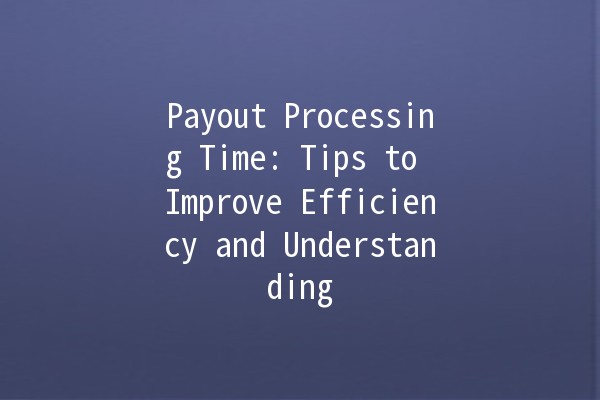In the everevolving landscape of online businesses, the efficiency of payout processing has become a critical factor for maintaining customer satisfaction and business credibility. Whether you operate in ecommerce, affiliate marketing, or any digital services sector, comprehending payout processing time can significantly impact your operations. This article delves into the nuances of payout processing time, offering valuable insights, strategies, and practical tips to optimize it for your business.
What is Payout Processing Time?
Payout processing time refers to the duration it takes for a financial transaction, such as payments to affiliates, freelancers, or service providers, to be completed from when a payout is initiated until the funds are available for the recipient. This time can greatly vary based on several factors, including the payment method chosen, regulatory requirements, and the internal processes of your business. Understanding and optimizing this timeframe is essential for enhancing user experience and operational efficiency.
Key Factors Influencing Payout Processing Time

Techniques to Enhance Payout Processing Efficiency
Here are five practical tips to improve your payout processing efficiency:
Explanation: Manual processing can slow down transactions and introduce errors. By automating your payout process, you minimize human intervention, leading to faster and more accurate transactions.
Application Example: Use software solutions that allow you to set up automatic payouts based on predefined criteria. For instance, in an affiliate marketing context, set up automatic payouts to affiliates once they reach a specific commission threshold.
Explanation: Offering various payment options allows recipients to choose the method that works best for them, which can significantly reduce processing times.
Application Example: If you are managing payments for freelancers, provide options that include PayPal, direct bank transfers, and newer methods like cryptocurrency. This flexibility can cater to diverse needs and decrease overall payout time.
Explanation: Regulations governing transactions can change frequently. Staying informed about these changes can help you avoid unnecessary delays due to noncompliance.
Application Example: Regularly review financial regulations relevant to your business operations and ensure your processes align with these legal requirements. This could involve attending workshops or subscribing to industry newsletters.
Explanation: Review and optimize the workflows involved in processing payouts. Identifying bottlenecks can help streamline the entire process.
Application Example: Map out your current payout processing flow. Identify stages that take longer than expected and explore methods to speed them up, such as adjusting approval workflows or reallocating resources during peak times.
Explanation: Providing recipients with realtime tracking of their payouts can enhance transparency and trust. This can alleviate concerns during longer processing periods.
Application Example: Utilize fintech platforms that offer tracking notifications for payments. Implementing a tracking system can help users see the status of their payout, reducing anxiety and improving the overall experience.
Addressing Common Questions on Payout Processing Time
Delays in payout processing can stem from various factors, including the chosen payment method, the volume of transactions being processed, regulatory compliance checks, and issues within internal processing systems. High traffic periods may lead to extended processing times, particularly if manual intervention is required.
Many financial organizations and payment processors provide online dashboards where you can track your payout status in real time. Look for notifications via email or alerts on your account dashboard that can guide you through the current status of your transaction.
The average payout processing time can vary widely based on the payment method and the business's internal processes. Typically, payouts via digital wallets may range from a few minutes to a few hours, while bank transfers might take 25 business days.
Yes, fees can apply depending on the payment method chosen. For example, credit card processors may charge a percentage fee per transaction, while digital wallets might have a flat fee structure. It’s essential to assess these costs as they can impact overall payouts.
It depends on the payment provider and the method being used. Some providers offer expedited processing for a fee, while others might allow prioritization for specific transactions depending on your business relationships.
Payout processing times can differ significantly by country due to factors such as local banking regulations, payment infrastructure, and financial technologies available. Some regions might be more advanced in digital payment solutions, allowing quicker processing.
Understanding and optimizing payout processing time is crucial for any online business. By implementing automation, utilizing multiple payment methods, staying compliant with regulations, streamlining workflows, and providing realtime tracking, businesses can not only improve their operational efficiency but also enhance customer satisfaction. Embracing these practices can empower your business to thrive in a competitive digital landscape, ensuring your clients feel valued and their transactions are handled with professionalism and speed. With optimized payout processes, you can build trust and loyalty among your audience, ultimately contributing to the longterm success of your enterprise.